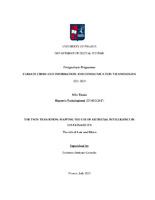| dc.contributor.advisor | Γκρίτζαλης, Στέφανος | |
| dc.contributor.advisor | Gritzalis, Stefanos | |
| dc.contributor.author | Τσακαλογιάννη, Ιφιγένεια | |
| dc.contributor.author | Tsakalogianni, Ifigeneia | |
| dc.date.accessioned | 2023-08-30T07:51:11Z | |
| dc.date.available | 2023-08-30T07:51:11Z | |
| dc.date.issued | 2023-07 | |
| dc.identifier.uri | https://dione.lib.unipi.gr/xmlui/handle/unipi/15670 | |
| dc.identifier.uri | http://dx.doi.org/10.26267/unipi_dione/3092 | |
| dc.format.extent | 194 | el |
| dc.language.iso | en | el |
| dc.publisher | Πανεπιστήμιο Πειραιώς | el |
| dc.rights | Αναφορά Δημιουργού-Μη Εμπορική Χρήση-Όχι Παράγωγα Έργα 3.0 Ελλάδα | * |
| dc.rights.uri | http://creativecommons.org/licenses/by-nc-nd/3.0/gr/ | * |
| dc.title | The twin transition : mapping the use of artificial intelligence in sustainability - The role of law and ethics | el |
| dc.title.alternative | Η δίδυμη μετάβαση : χαρτογράφηση της χρήσης της τεχνητής νοημοσύνης στη βιωσιμότητα - Ο ρόλος της νομοθεσίας και της δεοντολογίας | el |
| dc.type | Master Thesis | el |
| dc.contributor.department | Σχολή Τεχνολογιών Πληροφορικής και Επικοινωνιών. Τμήμα Ψηφιακών Συστημάτων | el |
| dc.description.abstractEN | The purpose of the present thesis is to map the most important AI governance and policy implications along with the legislation produced, in order to provide a thorough analysis of the ethical and legal concerns that arise with mass production and utilisation of AI, and, finally, to examine the interplay between AI and environmental sustainability. Section 1 serves as an introduction to AI itself and an overview of the branches and approaches of AI, while Section 2 focuses on the regulatory and ethical implications of AI use. In Section 3, the risks and the benefits of harnessing the power of AI towards green transition are highlighted and practical examples of environmentally sustainable AI are given. It is concluded that if properly governed, digitalisation through AI could make a decisive contribution to the establishment of a sustainable, climate neutral economy and society. To this end, certain recommendations are made in Section 4 towards an ethical and legal nexus between AI and sustainability, which include harnessing the potential of regulatory sandboxes, ensuring climate mainstreaming into AI, promoting cross-sectoral consistency of policies and fostering collaboration between all actors of economy and society. | el |
| dc.contributor.master | Κλιματική Κρίση και Τεχνολογίες Πληροφορικής και Επικοινωνιών / MSc in Climate Crisis and Information and Communication Technologies | el |
| dc.subject.keyword | Artificial intelligence | el |
| dc.subject.keyword | Sustainability | el |
| dc.subject.keyword | Climate change | el |
| dc.subject.keyword | Environmental policy | el |
| dc.subject.keyword | New technologies law | el |
| dc.subject.keyword | AI ethics | el |
| dc.subject.keyword | Regulatory sandboxes | el |
| dc.date.defense | 2023-07-25 | |



